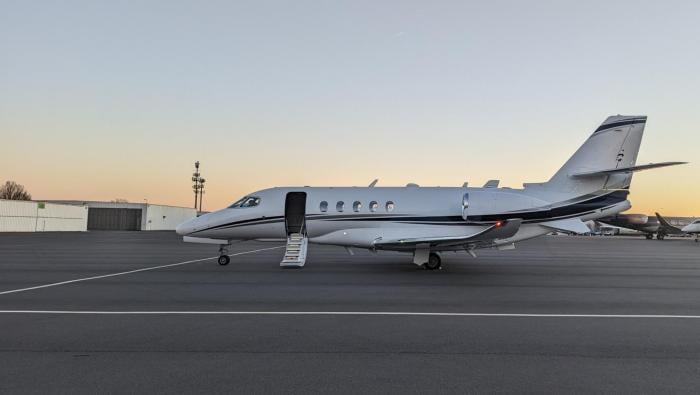|
Specialized communications company Apcela today inked a definitive agreement to acquire the SmartSky air-to-ground (ATG) network, with the deal set to close by year-end. SmartSky ceased operations on August 16 after spending years and hundreds of millions of dollars to build and stand up its ATG airborne connectivity network to compete with Gogo. Those with SmartSky systems installed on their aircraft will be able to reconnect to the ATG network when Apcela “turns on the switch.” The company's CEO Mark Casey told AIN this should happen in the next 60 days. Apcela has 20 years of experience in the communications network industry and built and managed SmartSky’s terrestrial network. While the U.S.-based group is new to the airborne connectivity consumer market, it does have a two-aircraft flight department and thus understands the end-user experience, Casey said. “By integrating SmartSky’s capabilities and Apcela’s advanced networking platforms, Apcela will launch a new aviation centric business that will provide unmatched performance and security, ensuring that airlines, corporate jet fleets, and other operators have access to fast, secure, and scalable solutions in real-time, anywhere,” the company said. Casey added that the SmartSky service will relaunch with some upgrades, including faster speeds and more security. He also intends to “reduce friction” for SmartSky installations by shipping kits that can be fitted on airplanes via field approvals instead of more costly supplemental type certificates. |
|
|
As the testing program for Bombardier’s new flagship Global 8000 nears completion, the Canadian airframer announced yesterday at NBAA-BACE that it has begun construction of the first production model of the ultra-long-range business jet. It will be the first built from the wheels up as a Model 8000, since modified Global 7500s were used for the flight-test program. Service entry is schedule for later next year. Éric Martel, the OEM’s president and CEO, said certification of the twinjet—a longer-legged, faster variant of the Global 7500—is expected to go smoothly as it approached 300 hours of testing. “We do flight testing across the product, so we are extremely happy with the result; the industry’s fastest speed, longest range, lowest cabin altitude, and smoothest ride is coming next year,” he said. Range is expected to be 8,000 nm at Mach 0.85, while its top speed will be Mach 0.94. Production of major components is currently taking place at Bombardier facilities in Saint-Laurent, Québec; Red Oak, Texas; and Querétaro, Mexico. A retrofit kit will be available for Global 7500 customers looking to bring their aircraft to the 8000 standard, a process that will take approximately 10 days in a Bombardier service center. Meanwhile, Bombardier is about to reach the 200th Global 7500 delivery, to be followed soon after by the 100th Challenger 3500 handover and 1,000th shipment of a 300-series Challenger. |
|
|
Following NBAA’s sale of its stake in EBACE earlier this year to EBAA, the annual show will still take place in its usual timeframe next year, EBAA COO Robert Baltus told AIN this week at NBAA-BACE. He confirmed that EBACE 2025 will take place May 20 to 22 at the Palexpo convention center in Geneva. “The show will be close to what [it] was last year,” Baltus said. “We are starting the process of reaching out to all the different stakeholders, the exhibitors, the attendees, and also our membership to find out what we expect from the show, what do we want, where do we want to go with the show. So we are doing a full 360, and we’ll try to adjust the show as much as we can.” When asked about the prospects of the show moving from its long-time host city of Geneva, he noted, “There’s no other location where you have the airport and that much exhibit space next to one another, it’s a great city with five-star hotels.” Five years ago, EBAA did a study to identify alternative locations and found very few that would meet the criteria of satisfying exhibitors, attendees, and organizers, Baltus said. “We’re not married to any concept or location, the most important thing is those three parties feel it’s worthwhile.” |
|
|
Blackhawk Aerospace has achieved first flight of a Daher TBM 700 retrofitted with a Pratt & Whitney Canada PT6A-66D engine and completed baseline flight testing for its re-engining supplemental type certificate (STC) program. The engine upgrade will bring the TBM 700 to similar performance capabilities as the TBM 850. During the initial flight, the testbed airplane—N590JL, serial number 306—“achieved higher speeds and altitudes than previous models, validating the engine's improved performance using the existing certified components,” according to Blackhawk. The STC development and flight testing is taking place at Blackhawk’s Waco, Texas headquarters. The upgrade replaces the TBM 700’s original 1,583-eshp PT6A-64 with the 1,825-eshp PT6A-66D, although the engines are flat-rated to 700 and 850 shp, respectively. Further flight testing is underway, and Blackhawk is collaborating with P&WC, Hartzell Propeller, and MT Propeller to “further refine performance metrics,” according to Blackhawk. The next steps in the STC program include detailed performance testing and specific inlet and propeller evaluations, with the goal of achieving the STC in the second quarter of next year. Blackhawk said it has already “received multiple deposits securing delivery positions and continues to accept deposits for 2025 and 2026 deliveries.” “This first-flight milestone represents a key advancement in our STC program, bringing increased power, performance, and sustainability to TBM 700 owners,” said Blackhawk Aerospace president Edwin Black. |
|
|
Sponsor Content: Duncan Aviation Duncan Aviation is investing $25 million in a greenfield hangar build at its Lincoln, Nebraska, MRO to include a new 32,500-square-foot, dual-bay paint hangar with an adjacent 9,000-square-foot storage and support area. The building will connect directly to Duncan Aviation’s existing paint facility and will be completed by early 2026. |
|
|
Vantage Aviation, which aims to establish a new FBO network, has acquired its first facility: Dominion Aviation at Richmond Executive-Chesterfield County Airport (KFCI) in Virginia. Dominion, the sole FBO provider at KFCI, offers ground handling, fueling, and hangar storage, in addition to aircraft charter management services, flight training school, and Part 145 repair station. The FBO’s 14,300-sq-ft private aircraft terminal includes crew and passenger lounges, 15- and 30-person-capacity conference rooms, on-site restaurant, showers, and flight-planning room, with amenities such as onsite rentals cars, crew cars, and catering. It also has four hangars totaling 50,000 sq ft of space, with one able to shelter a Gulfstream G650, and a 600,000-sq-ft ramp that can accommodate many business jets. Dominion’s managed charter fleet numbers 14 aircraft. Vantage was launched in the second quarter by founder and CEO Ryan Maxfield and partner and COO Kyle Cassidy to build and acquire FBOs and their ancillary charter, maintenance, and flight training businesses. Maxfield previously co-owned Jet Access Aviation/Jet Access Group, as well as First Wing Aviation and Eagle Creek Aviation Services, before selling his interests in them last year. Mike Mickel, who founded Dominion Aviation in 1983, will remain with Dominion Aviation with a focus on aircraft management services. |
|
|
Speaking yesterday at NBAA-BACE 2024, Daher Aircraft CEO Nicolas Chabbert championed the company’s recent hurricane relief efforts and discussed updates to the company's turboprop lines, as well as the Me & My TBM app. Chabbert noted Daher worked alongside private Kodiak and TBM owners to ferry vital supplies and rescue animals in the aftermath of Hurricanes Helene and Milton. Daher also provided on-site repair services for a U.S. Forest Service Kodiak 100 in North Carolina as part of the relief efforts after jet blast damaged the aircraft. For Daher, this kind of assistance is an ongoing effort. Chabbert pointed to the company's recently announced partnership with the Recreational Aviation Foundation to provide transportation support. “We are now on our second year to provide support to RAF,” Chabbert said, adding that the company will continue to provide long-term aid to the U.S. Forest Service and RAF. Meanwhile, he announced the latest upgrade for the Kodiak 100: integrating Hartzell Propeller’s five-blade composite propeller with a pitch latch function for water operations on floats. The pitch latch function enables float-equipped Kodiaks to maneuver more easily on water with greater control. Chabbert also unveiled Version 7 of its Me & My TBM cloud-based pilot app, highlighting changes that include integrated document management and real-time support for TBM owners and operators. |
|
|
Ingenio Aerospace has received Transport Canada supplemental type certificates (STCs) covering the installation of its Cockpit Tablet electronic flight bag (EFB) on Bombardier Global and 600-series Challenger business jets. The Montreal-based company said it expects both the FAA and EASA to sign off on the approvals by year-end. According to Ingenio, the Cockpit Tablet EFB makes it easier for pilots to access tablet devices during all phases of flight, including takeoff and landing. There are already around 1,150 Globals and 2,040 Challenger 600-series aircraft in service worldwide, and the STC also applies to new-build models. The certification covers devices with a charging capacity of up to 60 Watts, which is expected to meet the increasing power needs of devices for some time. Currently, most tablets require 15 Watts for a fast charge via a USB port. Ingenio's latest EFB features a USB-C connection. According to the company, the turnkey package includes EFB mounts, USB chargers, tablet holder, and complete electrical installation with an optional USB 2.0 data passthrough. It also features structural brackets for both the pilot and copilot positions. “USB power delivery is a well-established industry standard and more recently the European Committeee for Standardization has mandated use of USB type-C connectors,” said Ingenio president and CEO James Bell. |
|
|
Axis Flight Simulation is upgrading its full-flight simulators with additional virtual- and mixed-reality (VR/MR) technology developed in partnership with software subsidiary Propair Flight. The Austrian company’s AX-D Flex platform allows operators to train their pilots on multiple aircraft types using the same hardware. The companies recently announced that they are combining Axis’ ISO 9001-2015 and EASA/FAA level D-certified simulators with Propair’s VR and MR integration systems. They said this will permit them to blend new training capabilities with traditional methods for aircraft including Bombardier Challengers. According to Axis, Propair’s software will expand the capability of its simulator portfolio by making use of analytics-driven virtual environments to more closely adapt training sessions to each pilot’s needs. It said this will also reduce the time and cost of flight training and reduce workload for both instructors and trainees. The additional features will include Propair’s hand-and-eye tracking software, which it said enhances the way pilots interact with the cockpit. It uses flight and biometric data drawn from each pilot’s performance, situational awareness, and stress management. “Our partnership with Propair marks a significant leap forward in creating immersive experiences, setting new industry standards by integrating VR and MR capabilities into our wider offering to provide the next generation of training solutions,” Axis said. |
|
|
No one covers the news better at NBAA-BACE than AIN. We have a full editorial team on-site in Las Vegas for the show and their excellent stories can be found on our NBAA-BACE 2024 landing page. |
|
|
|
|
|
|
AINalerts News Tips/Feedback: News tips may be sent anonymously, but feedback must include name and contact info (we will withhold name on request). We reserve the right to edit correspondence for length, clarity, and grammar. Send feedback or news tips to AINalerts editor Chad Trautvetter. |
|
AINalerts is a publication of AIN Media Group, 214 Franklin Avenue, Midland Park, New Jersey. Copyright 2024. All rights reserved. Reproduction in whole or in part without permission is strictly prohibited. |
















